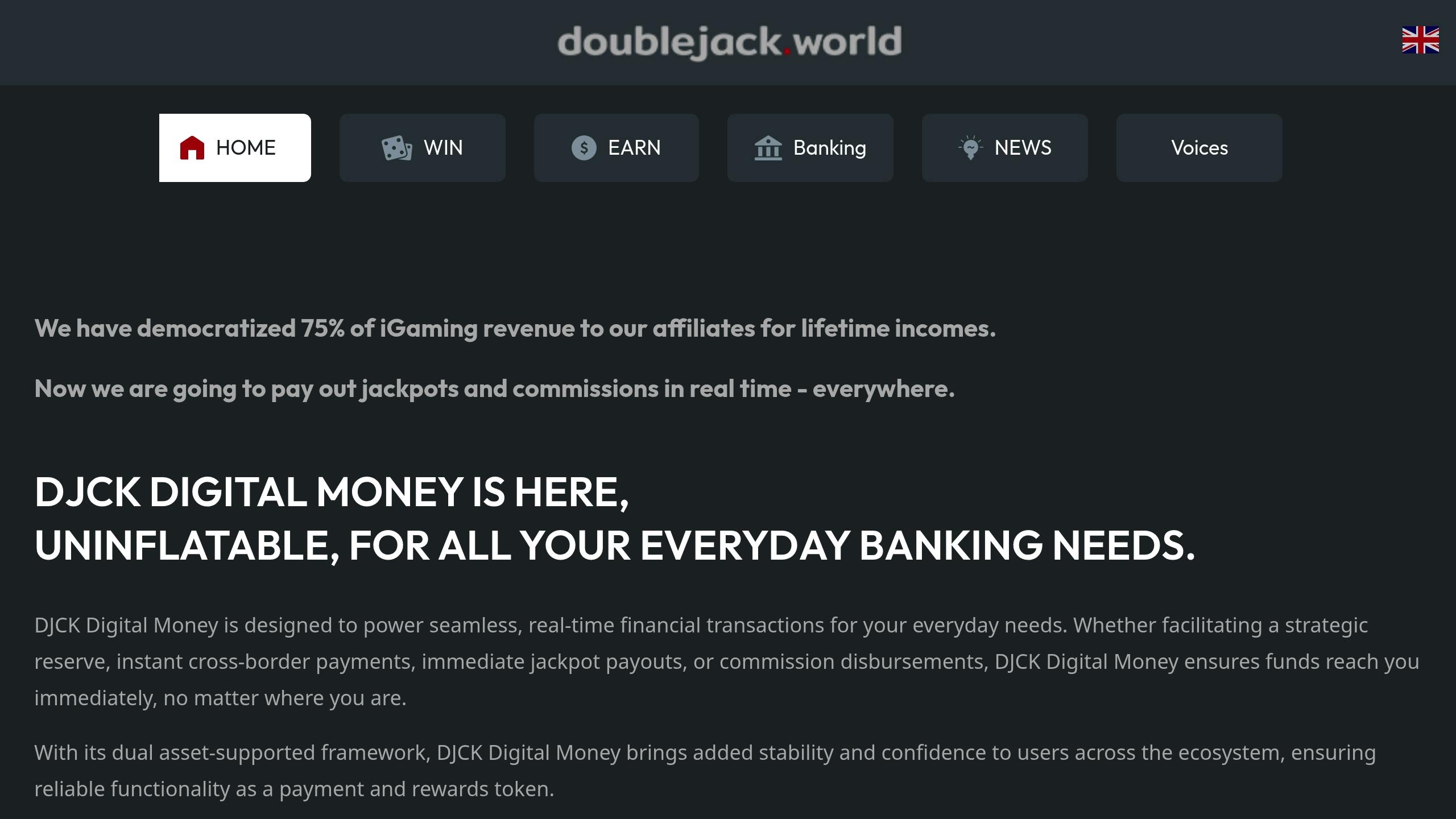
How Sports Tokens Navigate Global Regulations
Sports tokens are reshaping fan experiences and creating revenue for teams, but navigating global regulations is critical for their success. Here's what you need to know:
- What Are Sports Tokens? Digital assets that offer perks like voting on team decisions, exclusive content, and unique fan experiences.
- Key Benefits: Boost fan engagement, generate revenue, and build communities.
- Regulatory Challenges: Compliance with securities laws, anti-money laundering (AML) protocols, and data privacy rules varies by region.
- Global Rules: The U.S. SEC, EU's MiCA, and specific laws in Singapore and Japan create a complex compliance landscape.
- Solutions: Blockchain technology, like doublejack DJCK Digital Money, offers tools for tracking transactions, automating compliance, and ensuring transparency.
Platforms must meet KYC/AML standards, protect user data, and stay updated on evolving regulations to thrive globally.
Everything to Know About Fan Tokens w/ Alexandre Dreyfus ...
Global Regulatory Challenges
Sports token platforms operate in a challenging regulatory environment that differs widely across countries. Understanding and managing these variations is critical for businesses aiming to operate on a global scale.
Regional Rules and Standards
In the U.S., the Securities and Exchange Commission (SEC) regulates digital assets. Sports tokens must avoid being classified as securities under the Howey Test to sidestep extensive registration requirements. Meanwhile, the European Union is working toward a unified framework with the Markets in Crypto-Assets (MiCA) regulation. MiCA sets detailed requirements for token issuers, including registration, financial reporting, capital reserves, and consumer protections.
Singapore's Payment Services Act requires platforms to secure specific licenses based on their activities. In Japan, the Financial Services Agency enforces strict registration rules for virtual asset service providers. These regional differences also impact how tokens are legally categorized, adding another layer of complexity for platforms operating across multiple jurisdictions.
Token Classification Rules
How a token is classified determines its compliance requirements. Utility tokens must show a functional purpose within the sports ecosystem and avoid any promise of financial returns. Security tokens, on the other hand, are treated under traditional securities laws, requiring detailed disclosures and registration. The situation becomes more complicated when tokens combine features like voting rights and revenue sharing, as different jurisdictions may apply unique regulations.
Blockchain solutions, such as doublejack DJCK Digital Money's dual-asset support framework, help simplify this process. These tools provide clear token classification and transparent tracking to ensure compliance across various regulatory environments.
sbb-itb-4720f98
Steps for Meeting Regulations
Sports token platforms need strong compliance systems to operate on a global scale. Below are the steps platforms can take to meet regulatory demands effectively.
KYC and AML Requirements
To meet Know Your Customer (KYC) and Anti-Money Laundering (AML) standards, platforms should focus on the following:
- Identity Verification: Confirm user identities using government-issued IDs, proof of address, and biometric details.
- Risk Assessment: Analyze user profiles by reviewing transaction patterns and geographic location.
- Transaction Monitoring: Track transactions in real-time to identify unusual activity, such as high volumes, cross-border trends, or questionable fund sources.
While verifying identities and monitoring transactions is critical, safeguarding user data is just as essential.
Data Protection Standards
To comply with regulations like GDPR and CCPA, platforms must prioritize user privacy and data security. Key steps include:
- Data Mapping: Identify where personal data is collected, stored, and processed.
- User Rights Management: Handle requests for data access, deletion, or portability in a timely manner.
- Security Measures: Use encryption for data both at rest and during transmission.
Additional privacy-focused measures should include:
- End-to-end encryption
- Regular security audits
- Clear policies on data retention
Keeping up with regulatory changes is just as important as protecting data.
Tracking Rule Changes
Platforms must have a structured system for staying informed about and adapting to regulatory updates. Steps include:
- Regulatory Intelligence: Subscribe to updates from key regulatory authorities.
- Documentation Updates: Ensure compliance-related documents are regularly reviewed and updated.
- Staff Training: Provide ongoing training to employees on new regulations and compliance procedures.
A dedicated compliance team can help by:
- Monitoring announcements from regulators
- Evaluating how changes impact operations
- Updating systems as needed
- Conducting periodic audits
This proactive approach helps platforms maintain compliance as laws and regulations evolve.
Blockchain Technology in Compliance
Blockchain technology takes traditional compliance measures to the next level by offering transparent and efficient solutions. It provides sports token platforms with tools to navigate the complex regulatory requirements across different regions.
doublejack DJCK Digital Money Compliance Features

doublejack DJCK Digital Money showcases how blockchain can support compliance through several standout features:
- Dual-Asset Framework: Backed by gold reserves and iGaming revenue, this framework promotes financial stability.
- Transaction Tracking: Real-time tracking of transactions makes it easier to provide proof of compliance.
- Global Reach Infrastructure: With operations in over 190 countries, the platform uses an ISO 20022-compliant system for standardized processing and reporting.
These features highlight how blockchain can meet regulatory needs effectively.
Blockchain's Role in Regulation
Blockchain's core characteristics also strengthen compliance efforts beyond specific platforms:
- Immutable Record Keeping: Permanent transaction histories create reliable audit trails for verification.
- Smart Contract Automation: Regulatory rules can be enforced automatically, reducing human error and enabling quick updates to match regulatory changes.
- Enhanced Security Features: Cryptographic methods safeguard sensitive data, while automated threat detection helps maintain system security.
This combination of features and inherent properties makes blockchain a powerful tool for regulatory compliance.
Next Steps for Sports Token Compliance
Key Points Recap
Sports token platforms must implement structured compliance measures. Strong KYC (Know Your Customer) and AML (Anti-Money Laundering) protocols, along with data protection frameworks aligned with regional standards, form the backbone of compliance efforts. Blockchain technology plays a vital role here, offering tools like smart contract automation and immutable record-keeping. These features make it easier for platforms to stay compliant across various jurisdictions and prepare for regulatory shifts.
Preparing for Future Regulations
Looking ahead, platforms need to gear up for new regulatory challenges. A great example is the dual-asset framework used by doublejack DJCK Digital Money, which integrates stability and transparency into its operations. This approach provides a solid foundation for meeting both current and upcoming compliance standards.
Here are some important steps platforms should take to stay ahead:
- Adopt ISO 20022-certified systems: These systems ensure standardized global transactions.
- Establish verifiable asset reserves: This boosts financial stability and builds trust.
- Implement automated compliance monitoring tools: Automation helps streamline oversight and ensures adherence to regulations.
As regulatory frameworks continue to evolve, blockchain-based compliance tools will become even more essential. Platforms should prioritize creating adaptable systems that meet new requirements without sacrificing efficiency.

